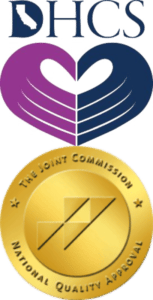Intensive
Outpatient Program
in Los Angeles
Clinically Reviewed by: Monica L. Martocci
Intensive Outpatient Program In Los Angeles
At present, America is home to over 328 million people, and tragically, about 21 million of these individuals are wrestling with substance use disorders. Out of this daunting number, only slightly over 2 million seek assistance from an addiction treatment center.
If you’re considering our intensive outpatient program (IOP) in Los Angeles, you’re one step closer to joining the 10% of people battling addiction who seek and find the path to recovery. With numerous drug rehab options available, it can be difficult to discern which treatment plan will lead to sustained sobriety. If you’re seeking balance in your work and personal life while staying connected to a robust support network, an IOP in Los Angeles, California, might be the best fit for you.
What Is an IOP?
While learning about addiction recovery, you’ll encounter several terms, each representing a different level of care within rehab programs. Here are what the most common terms stand for:
- RT - Residential Treatment (Inpatient Rehab)
- OP - Outpatient Treatment
- PHP - Partial Hospitalization Program
- IOP - Intensive Outpatient Program
Inpatient treatment (IP) involves a full-time stay at a rehabilitation center or sober living house. This is often the best option for someone who is about to go through withdrawal and needs medical supervision to see them through.
Outpatient treatment (OP) is for someone who is ready to return to their regular life, including work or parenting. They might return to their former rehabilitation center for one-on-one or group counseling.
A partial hospitalization program (PHP) is for someone who isn’t quite ready to return to regular life. So, they’ll spend most of their days in a treatment center acquiring further skills for recovery and then go home at night (if it’s a safe environment).
Finally, a Los Angeles intensive outpatient program (IOP) falls in between outpatient and partial hospitalization programs. Someone in this stage of recovery might return to their job, but they’ll still spend a significant amount of time in counseling.
So, they’re not in a PHP because they don’t spend their days at the rehabilitation center. However, they do come back for outpatient care more often than someone seeking general outpatient treatment.
How Is an IOP Used?
An IOP is particularly effective when the participant has a stable home environment, free of ongoing substance abuse or any conditions that might lead to relapse. This treatment modality is also often beneficial for those grappling with dual diagnosis – struggling with mental health issues alongside substance abuse. It wouldn’t be helpful to return home to a detrimental setting after sessions at the rehab center.
Our IOP in Los Angeles not only addresses addiction and co-occurring disorders but also assists with vocational training, paving the way for a fresh phase of life. You’ll receive ample counseling to enhance problem-solving skills, handle behavioral changes, and build a resilient support system.
Substance Use Disorders and Drug Abuse Amongst the LGBTQ+ Community
Data from the 2020 National Survey on Drug Use and Health (NSDUH) found that in 2020, approximately 21.8% of sexual minority adults had an alcohol use disorder in the past year, 1 compared to 11.0% in the overall population. Additionally, approximately 6.7% of sexual minority adults in 2020 misused opioids (prescription opioids or heroin use) in the past year, compared to 3.6% of the overall adult population.
At No Matter What Recovery, our IOP program integrates specialized counseling, support groups, and access to LGBTQ+-informed resources, ensuring that treatment is both comprehensive and sensitive to the needs of this community. By doing so, we aim to empower our LGBTQ+ clients, helping them to navigate the challenges of recovery while also rebuilding their lives with dignity and strength.
How Long Is an IOP Program?
While an IOP may sound like traditional outpatient rehab, it’s a more extended commitment. Patients generally participate in counseling sessions three to five times a week, with a weekly total of nine or more hours of treatment.
Our IOP emphasizes group therapy as it fosters the development of social skills in a substance-free environment. You’ll be introduced to a 12-step program, a lifelong tool designed to help you navigate the journey of recovery.
IOP vs. PHP
It may be easy to see the difference between an outpatient program and an intensive outpatient program. But what about partial hospitalization?
With an inpatient treatment program, people choose to be completely removed from their normal environment. There’s zero opportunity to gain access to alcohol or drugs. (Or, at least, there should be.)
Meanwhile, a partial hospitalization program is an option for someone who may still be experiencing withdrawal symptoms, even after inpatient treatment, and is still having difficulty managing their cravings toward substance abuse.
An IOP is for someone who handles their addiction, can start earning a living again or caring for their family again, and will visit a treatment center several times a week for group therapy, vocational training, and other outpatient programs.
What Our Clients Say







Who Could Benefit from Intensive Outpatient Programs (IOP)?
Intensive Outpatient Programs (IOP) provide an intermediary level of care, bridging the gap between inpatient residential treatment and sober living treatment options and traditional outpatient services. Their structured yet flexible day treatment can be immensely beneficial for various individuals. Here’s a rundown of those who might find IOPs especially advantageous:
- Transitioning Individuals: Those who have completed a residential or inpatient treatment program but still need structured support throughout the recovery process for a substance use disorder can benefit immensely from IOPs. It provides a transitional phase, allowing them to gradually reintegrate into everyday life with continued therapeutic support.
- Working Professionals: For those who cannot take extended leaves from work but recognize the need for structured treatment, IOPs offer the ideal solution, allowing them to balance professional commitments with recovery.
- Early Stage Addictions: Those who are beginning to recognize problematic behaviors or patterns but don’t necessarily need residential care may find the level of intervention in an IOP to be just right.
- Relapse Prevention: Individuals with a history of relapses, even after completing a treatment plan or program, could use IOPs as an extended support system to reinforce coping strategies and maintain sobriety.
- Dual Diagnosis Cases: For those dealing with both substance abuse and mental health issues/ mental health disorders (co-occurring disorders), the comprehensive care approach of IOPs can be beneficial.
- Those with a Strong Support System: Individuals who already have a supportive home environment can maximize their recovery by combining the strengths of their personal support system with the structured therapeutic interventions of IOPs.
The Benefits of an IOP Program
Intensive Outpatient Programs (IOPs) offer an array of benefits to individuals grappling with substance use disorder, serving as a critical part of the recovery process. IOPs incorporate a blend of evidence-based therapies, comprehensive case management, and support for mental health issues to provide a robust approach to addiction treatment.
Range of Therapies
IOPs employ various therapeutic modalities, including Cognitive Behavioral Therapy (CBT) and Dialectical Behavior Therapy (DBT), tailored to address the unique needs of each individual. CBT is instrumental in helping individuals understand and change patterns of thought that lead to harmful behaviors, while DBT focuses on imparting skills like mindfulness, emotional regulation, and distress tolerance, which are crucial for long-term recovery.
Comprehensive Case Management
Within IOPs, providers offer intensive case management services to ensure that every aspect of an individual’s treatment journey is coordinated effectively. Clinicians work closely with individuals to manage their care, connecting them with resources, and addressing any barriers to their recovery.
Addressing Mental Health Issues
Mental health issues and substance use often go hand in hand. IOPs place a significant emphasis on identifying and treating co-occurring mental health conditions like bipolar disorder. This approach not only involves individual therapy sessions but also integrates medication management and other disorder treatments as needed, ensuring a holistic treatment approach.
Family Involvement
IOPs often incorporate family therapy into their treatment services. Family involvement can be a valuable support in an individual’s recovery process, fostering understanding, building healthier dynamics, and promoting mutual healing.
Mindfulness Practices
Mindfulness is a key component of many IOPs, assisting individuals in developing greater self-awareness and self-esteem. Mindfulness exercises are tools that can help individuals navigate stressors and avoid relapse, making them an essential part of many IOPs.
Network Benefits
Many IOPs are “in network” with insurance providers, making these programs more accessible to individuals seeking help. These partnerships can significantly reduce out-of-pocket costs, eliminating financial barriers to treatment.
Aftercare Planning
The recovery journey doesn’t end when the formal treatment concludes. Aftercare planning is a vital part of IOPs, providing continued support and resources to maintain sobriety and prevent relapse in the long term.
Frequently Asked Questions
Upon initial interview, our goal is to identify the immediate clinical needs of the individual, as well as obtaining a history of clinical issues and of any prior treatment. This includes a history of the individual’s substance use/abuse, as well as a history of any signs or symptoms of depression, anxiety, trauma, suicidal ideation/attempts, self-harm, psychoses, school/work/legal problems, food issues/eating disorders, violence and other behavioral disorders. If left unattended, these issues frequently manifest into major mental health concerns, which increase in chronicity and frequency. By assessing them early and addressing them during treatment, the opportunity is created to bring awareness and then there is potential for resolution.
Assessment is the first step in the formulation of an intervention plan. It is an ongoing process, beginning with the initial screening and continuing throughout the counseling process. It includes the gathering of facts and data regarding past and present functioning, environment, and culture. The process must be seen through the bio-psycho-social model and the assessment must also include the individual’s abilities, strengths, weaknesses, problems (acute or chronic), stressors, safety/danger areas, urgency, needs and resources, and relationship to cultural/spiritual background.
Emotional and substance use disorders, regardless of severity, tend to be persistent and recurrent. Co-occurrence of these disorders occurs with sufficient frequency that a continuous and integrated approach to assessment and treatment is required. Principles of care within mental health and addiction fields concentrate on respect for the individual, belief in the human capacity to change, and the importance of community, family, and peers to the recovery process.
Toggle Content
While both are outpatient services, an IOP requires a greater time commitment per week and provides more intensive services. Outpatient treatment might consist of weekly therapy sessions, while an IOP includes multiple sessions per week, group therapy, and possibly other support groups or wellness activities.
Intensive Outpatient Program in Los Angeles with No Matter What Recovery
A strong IOP will hone in on the underlying issues that led you to substance abuse and equip you with a wealth of tools to safeguard you against future relapses. Although millions of people are still suffering today, millions have beaten their addictions. We know you can, too.
Here at No Matter What Recovery, we offer the holistic healing, comprehensive care, and mental health treatment programs you need to recover. If you’re ready to advance to the next stage in your recovery and need an IOP in Los Angeles, we hope you’ll give us a call today.
When you’re ready, we’re here to lend a helping hand.

Monica received an M.A. in Clinical Psychology from Pepperdine University, a B.A. in Psychology from the University of Colorado, and is a licensed Marriage and Family Therapist

Monica received an M.A. in Clinical Psychology from Pepperdine University, a B.A. in Psychology from the University of Colorado, and is a licensed Marriage and Family Therapist



